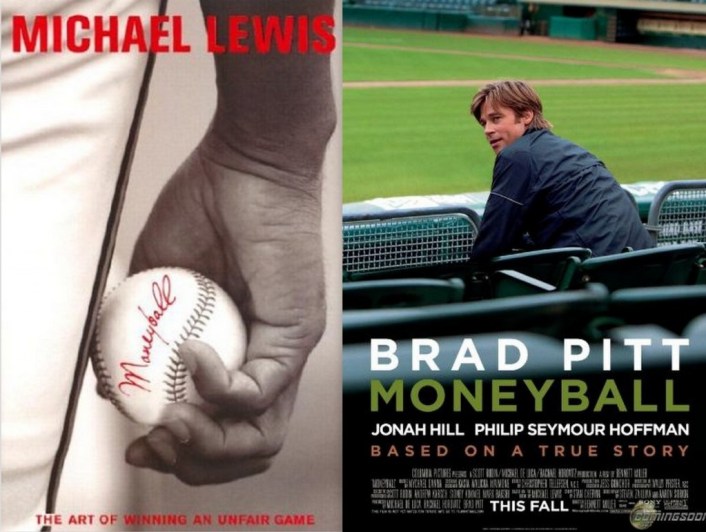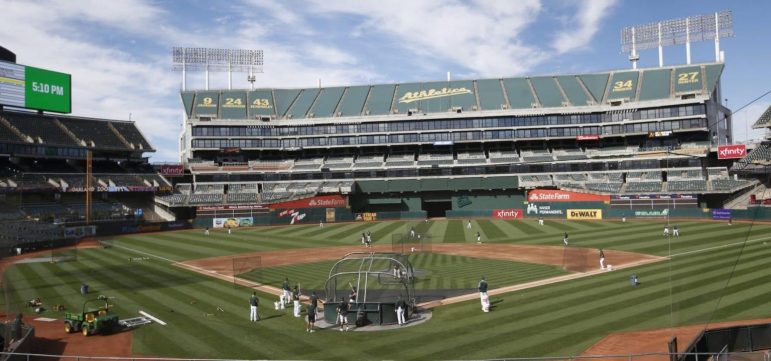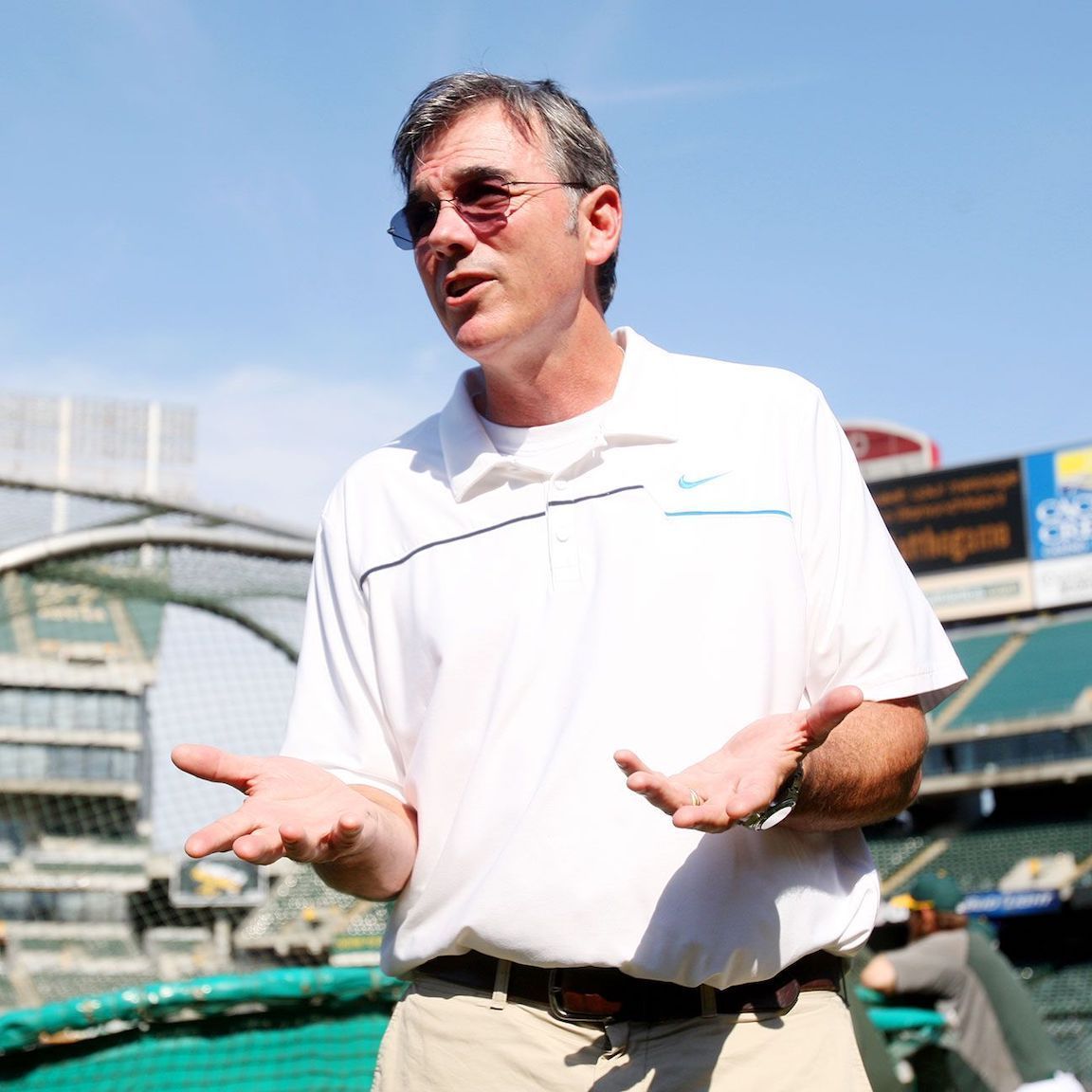If Billy Beane truly is set to leave Oakland, the best tribute I can pay the longtime A’s executive is to respond as coldly as he has after countless great players exited during his tenure.
Thanks for the memories, Billy. Now, who’s next?
I don’t mean to be mean-spirited or callous, especially toward my fellow Oakland fans who have invested a lot of pride in Beane’s celebrity and A’s accomplishments. But I just don’t buy the conventional wisdom that Beane is irreplaceable. In fact, I think it is well past time for an amicable split between the A’s and baseball’s most famous executive.
After 31 years as an Oakland A’s employee, Beane plans to leave the storied franchise. His departure would come just as the special-purpose acquisition company he co-chairs is widely reported to be buying a share of the parent company of the Boston Red Sox and Liverpool Football Club.
Beane, who owns a small percentage of the A’s, can’t own parts of two competing MLB teams, and news reports say he likely will leave the A’s to focus on the Sox and his growing passion for soccer.
A lot of local fans are bummed about Beane’s departure. I’m not one of them.
I believe his complex high-profile legacy places him in a strangely rare position: He’s been both very good at his job and vastly overpraised.
And if my emotions are conspicuously mixed, that’s because so is his record.

Beane, the subject of the 2003 bestselling book “Moneyball” by Michael Lewis and the hit Brad Pitt movie (2011) of the same name, has been lionized as a groundbreaking maverick who forever changed the way sports executives evaluated players. Part of that is true. He did provide a landscape-changing example by (sometimes) winning on shoestring budgets by using sabermetric analytics to judge players. He’s undeniably made an impact on the game in new and unforgettable ways, which will surely land him one day in the Hall of Fame.
Hold your applause
But was Beane truly as great as his press clippings? Does his departure doom the Oakland franchise’s future? Does he deserve the endless fawning praise he constantly receives? To all queries the answer is a resounding “No.”
I’ll pause here to let A’s fans spit out their coffee and call me an expletive.
I feel your pain, Oakland faithful. I don’t blame you one bit for yelling, “Can’t you be positive? We have a cheapskate owner, the local media treats us as an afterthought and, even in good seasons, the A’s kick us in the stomach each October. How about one farewell feel-good column about all those memorable A’s squads?”
I wish I could. I would love to embrace the popular myths about Beane. But the facts — lots of them, actually — won’t allow me.
While conventional wisdom says he is one of the game’s best general managers ever, I say Beane was very, very good, yet merely the fourth-best general manager in A’s history.
Pausing again here for more expletives.
Consider: Beane was in charge of building A’s rosters for more than two decades and his teams never once made it to the World Series, let alone win one. By that criterion, he finishes far behind Charlie Finley, Connie Mack and Sandy Alderson.

Beane’s staunchest defenders see him as an avatar representing their passionate A’s fandom. I get that. I can already hear their familiar rebuttals: “How can you criticize Billy when he’s always been hamstrung by greedy, stingy owners?”
That was a fair question from 1999 to 2004, a glorious half-decade of winning known as the Moneyball years. But in 2005, John Fisher and Lew Wolff made Beane a co-owner.
As soon as he inked that deal, Beane stopped being the rebel dragging his greedy bosses into first place and immediately became one of “them” — an equally stingy co-owner who profited handsomely from the team’s penny-pinching business model. They spent as little as possible each year and let MLB’s revenue sharing system provide the profits, letting fan-favorite players go as ownership did little but whine about the aging Coliseum and “the limitations of this market” while angling to leave Oakland.
To Beane’s credit, he and his creative staff truly weaved magic in some of those seasons, spinning gold out of several underrated, overlooked players for half of the 22 seasons he constructed A’s rosters. The downside? For 15 years now, he has directly profited from the same business model he was lionized for bucking in the book “Moneyball.”
Sorry, you can’t have it both ways, even though many seem eager to let Billy do so.
Also, Beane delivered far more excuses than glory years. When the team underperformed each October, Beane was always prepared (perhaps too ready) to blame something beside himself or his staff. “My s*** doesn’t work in the playoffs,” Beane says in “Moneyball.”
That’s an understatement.
By the numbers
In the Beane era, the A’s playoff record is a horror story. The squad went 0-3 in wild card games and suffered a 2-9 record in playoff series. Before this October, the A’s suffered nine consecutive losses in postseason winner-take-all games — a nearly 20-year streak of futility from 2000-2019. The A’s also lost 15 of 16 potential series-clinching games in that time. The only playoff series victories — an ALDS sweep over Minnesota in 2006 and a three-game tilt against the White Sox earlier this month — were followed by resounding defeats.
Beane always responded to those crushing losses with a shrug, saying the playoffs “are a crapshoot.” It’s remarkable that he rarely faced criticism for that flippant defense of his awful playoff record because it told everyone, including the many employees he was charged with leading, that there is no accountability for their results. After all, if you’re telling your employees that what they do at the most important time of the year doesn’t really matter, are their ensuing failures a “crapshoot” or a self-fulfilling prophecy?
And sorry, it was part of Beane’s job to win in the playoffs. I mean, you would never praise a political consultant for saying, “My candidates always run great campaigns except for those pesky voting results. Elections are a crapshoot, am I right?”
I’ll never understand why Beane’s A’s teams never sought to be more versatile so that they could succeed in the very specific style that tends to win playoff games. So, you don’t bunt, steal bases, or hit-and-run from April to September? Cool. Well, that doesn’t mean you can’t execute a little small ball occasionally in October, when playoff games usually are tense, well-pitched, low-scoring affairs in which every run is paramount.
Strangely, A’s teams of the past 20 years never did. Which brings us to another point:
Questionable game strategies
Beane’s hubris, ego, and stubbornness often got in the way when the chips were down.
It wasn’t enough to just win in big games, the A’s in his tenure often made head-scratching strategic decisions that seemed intended to show off Beane’s genius rather than just make the simple, sensible move. That might sound like a far-fetched theory, but I ask you: Why else was Daric Barton — a perennial underachiever but nevertheless a longtime Beane favorite — in the starting lineup in Game 1 of the 2013 ALDS playoffs? Barton struck out in every at-bat that night and his defensive miscue in the first inning contributed to a three-run Detroit rally in a low-scoring loss decided by a run, leading to a series defeat decided by one game.

The 2018 wild card game featured a similar, “look-Ma-I’m-general-managing” strategy.” The A’s passed over veteran hurler Mike Fiers, who had pitched well down the stretch, and instead started reliever Liam Hendriks in a “bullpen game” approach that was in vogue that season but had never been tried in a wild card game. How’d it go? Well, Hendriks gave up a first-inning home run to Aaron Judge that landed somewhere in Connecticut, and the Yankees never looked back, winning 7-2.
In this year’s playoffs, the head-scratchers continued. Oakland faced a White Sox team that was undefeated against lefties. So, who did they start in Game 1? Left-handed pitcher Jesús Luzardo, who was roughed up for three runs in little more than three innings, as Chicago won by a score of 4-1.
The Raiders’ Al Davis was known for similarly odd personnel decisions that only made sense if you accepted the egotistical maverick was just trying to show he was much smarter than everyone else. Davis’ narcissistic moves predictably failed with greater regularity in his final years. The one difference between Davis and Beane is that the Raiders owner rewarded his fans with three championships, while Beane’s trophy room remains empty, and his next World Series appearance will be his first.
And if your counterargument is that A’s manager Bob Melvin made those decisions, please stop. Beane’s controlling nature led him to clash with previous managers Art Howe and Ken Macha, leading a player once to complain anonymously to a reporter that “everyone knows Billy is managing from the weight room.”
To be fair, Beane and current A’s GM David Forst have long made some amazing personnel moves, and continued to do so up until the end of this strange, coronavirus-abbreviated season. Who, for example, could have predicted reliever Jake Diekman would be such a stalwart arm this year? Who else saw greatness for young Ramón Laureano before Beane and Forst traded for him?
It’s true that Beane and his staff have made moves that allowed the A’s to remain competitive in many seasons. Then again, those competitive years have been followed by long stretches of losing. The barren 2015-2017 seasons were only outdone by the futility of the 2007-2011 years. That half-decade span of misery only ended when A’s players mutinied in midseason against incompetent manager Bob Geren (a Beane friend and crony). The disastrous Geren years led to the hiring of Melvin, the only A’s skipper who has both won with regularity and gotten along with the famously hot-tempered Beane.
Blame it on the Coliseum
My biggest issue with Beane, however, is tied to his chronic complaining about the Coliseum and “the challenges of this market.” Look at this decade-old quote:
“Why do people care about anything we do?” Beane said in a 2009 ESPN article by Howard Bryant. “We play in a crappy stadium, in a market that we share with another team, with one of the lowest payrolls in the game. Really, I’m not that interesting.”

Ah, the good ol’ humblebrag approach.
There’s Beane again, spending way too much energy lowering expectations rather than crafting a positive narrative that might actually solve the team’s attendance and ballpark issues. It’s yet another example of him trying to have it both ways.
For a guy who spent countless interviews lamenting the old Coliseum or “the challenges of this market,” how often did you ever see Billy show up to council meetings or partner with Dave Kaval (or Lew Wolff before him) to be an active part of the ballpark solution?
Sure, Beane’s defenders will say it wasn’t his specific job or maybe he didn’t want to step on the toes of less-famous colleagues leading the ballpark charge. But, I would argue the opposite. If you’re going to constantly complain about your stadium, fan attendance, and home region (which Beane certainly did), while also enjoying the profits that come from being part of a stingy ownership group (which Beane certainly did), then you must make a greater effort to find solutions to those same problems (which Beane decidedly did not).
Not a Town guy
Lastly, Beane, who lives in an affluent East Bay suburb, never embedded himself in The Town in any meaningful ways away from the Coliseum. You can find Marshawn Lynch at his Old Oakland store on many days, or Rickey Henderson at his favorite Grand Avenue sushi joint.
I’ve heard plenty of stories about Tony La Russa talking to locals while picking up his daughter from ballet practice in Rockridge or former A’s pitcher A.J. Griffin buying beers for fans at Jack London Square. Or vintage tales of Kenny Stabler drinking away the pain of a playoff loss at a downtown Oakland dive. Hell, Lois the Pie Queen still has a dish named after Reggie Jackson, honoring Mr. October for all the breakfasts he scarfed at the legendary North Oakland diner.
In contrast, I’ve heard zero stories about Beane hanging out in The Town. Like, zero. None.
How can we miss Beane when he was never really here?
If this truly is goodbye, I sincerely thank Beane for his many contributions to the recent success and history of the Oakland A’s.
After being lauded in the book “Moneyball” as a romantic who turned his back on the short money and stuck around the East Bay to fight the underdog’s battle, Beane appears set to leave the A’s after more than three decades. He has joined his old boss Wolff as part of the management team of their new company, RedBall Acquisition Corporation.
His use of sabermetric analytics to evaluate athletes better is no longer the exception, it has become the norm in baseball front offices and in those of nearly all other sports. Beane no longer is an underdog. In fact, with RedBall he will be as mainstream as it gets in 21st century business. He is now a rich celebrity working to get a little bit richer. It’s a chapter in his life that is completely new and somewhat interesting. Aside from that, there’s nothing at all romantic or special about it.
Sounds about right.
